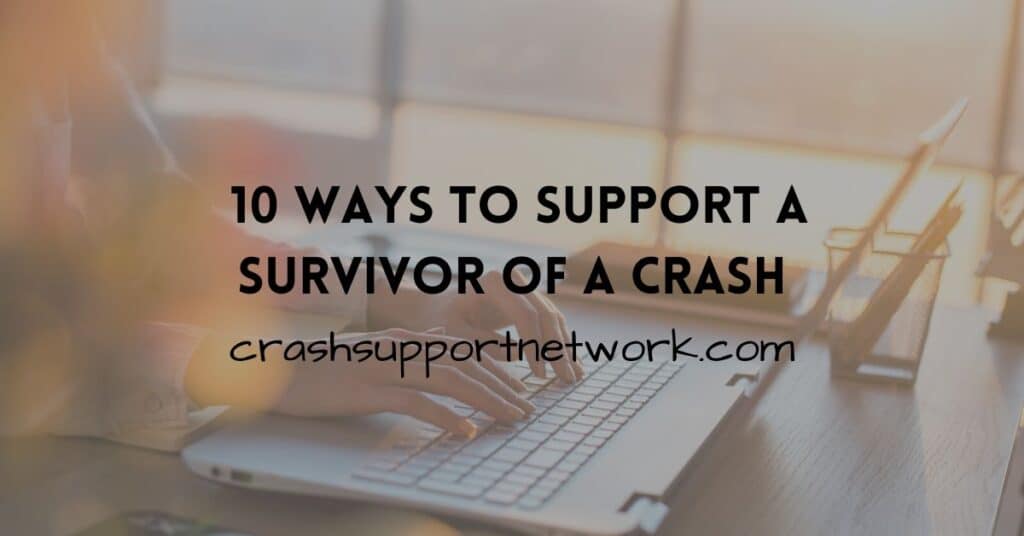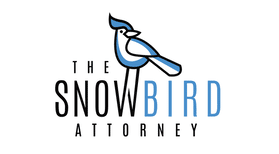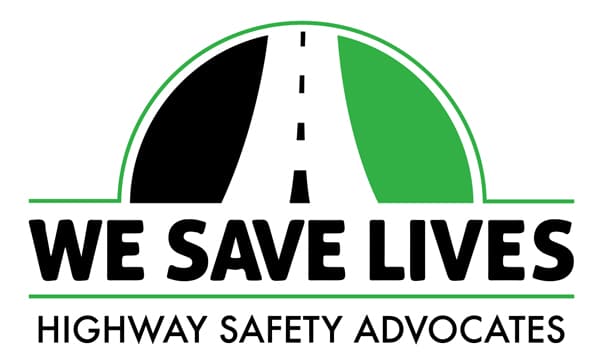
As a survivor of a crash, our life is unexpectedly turned upside down in a matter of seconds. We will be struggling physically, financially and emotionally. Many survivors of a crash will be trying to find their new normal and it is extremely difficult when we have a significant change in our independence, our stability with employment and our social life. Connection and compassion can play a significant role in a survivor’s recovery. Here are 10 ways you can support a survivor of a crash.
Never Show Up Unannounced
If a crash survivor cannot speak to you personally, reach out to a family member or friend to see if it would be okay to stop by for a visit. DO NOT just show up at the hospital to see them as the survivor will be overwhelmed. Hospitals are an extremely busy place with doctors and nurses hustling about and you do not want to come at an inconvenient time. Make sure the survivor is up for the visit and be prepared as they may or may not want to see you. Don’t take it personally. We understand that you are concerned but remember: It’s NOT about you.
Stay Positive & Upbeat
If you are visiting with a survivor of a crash whether in the hospital, a rehabilitation centre or at their home, prepare yourself that they may or may not be visibly hurt. Try your best to smile as the last thing a survivor of a crash needs to see is your facial expression alerting them to how they may look. If the survivor wants to talk about the crash, listen and remain upbeat. Be supportive and let them know you are there for them. Keep in mind that some injuries are not visible. Be conscious of the amount of time that you stay for a visit as survivors need to focus on their rest and recovery.
Send Us Mail
If you are miles away and cannot visit or your schedule doesn’t allow it, send them a card to let them know you are thinking about them. Enclose a note that they can read including a funny memory that the two of you may have shared. A survivor of a crash needs to feel connected and mailing a smile or laugh can go a long way. Recovery may be a life-long journey for a survivor of a crash so don’t just stop with one card. Try and send them mail every so often throughout their recovery and not just on special occasions.
Don’t Rush A Survivor’s Recovery
One of the most common things a survivor of a crash will hear from close friends or even family members is: “You Need to Get Over It”. This is one of the worst things you can say to us. Although we survived the crash and your life has moved on, most of us feel stuck with our daily struggles and we are trying our best to return to our old selves we once knew before our crash. Telling a survivor to “Get Over It” is not tough love. Please be sensitive to our feelings as we need your support.
Please Do Not Disappear
A survivor of a crash will need endless support. Even though your life may get busy, try your best to stay in touch with us. As survivors recover, we will constantly feel isolated and overwhelmed. In this day and age with modern technology, a quick text to let us know that we are thought of can go a long way. There is no excuse for you to stop connecting with a survivor of a crash. Please do not leave it up to the survivor to connect with you.
Do Not Get Upset
You may be having a party at your place to celebrate a special occasion or you may be having your annual family BBQ and we have confirmed two weeks in advance that we will be attending. When the day arrives, we may have had a terrible night’s sleep the night before, or we may have woken up to an extremely bad pain day. Please do not get upset, argumentative or try to convince us to come anyways when we call you to cancel. We already feel terrible that we cannot attend and do not need the added pressure. If your family is hosting something where you reside, communicate to them why you are not feeling well and kindly excuse yourself from the event that is taking place. Don’t blame survivors for behaviours that are out of their control. Please understand that we would rather be having fun with you versus having to excuse ourselves.
It’s Called Support
When a survivor of a crash is recovering, the last thing we want to hear is how we may have inconvenienced you. We are already struggling in more ways than you could possibly imagine as our life has literally been turned upside down. Recovery is extremely stressful for a survivor of a crash so if you are feeling frustrated, please find someone else to vent to. Always remember that we already feel like a burden and do not need to hear how our crash affected you. Everything that you may have done or are continuing to do for us during our recovery should be of good will.
Comfort Level
As a survivor of a crash, it took me numerous months before I could even get behind the wheel of another vehicle and I still feel nervous as a passenger. Please do not try to convince us to drive when we do not feel up to the task. Crash survivors will get back behind the wheel when they feel comfortable enough. If you have offered to drive us somewhere, be aware that we could be feeling quite anxious so try your best to make us as comfortable as possible and pay attention to the road.
Don’t Ask Just Do
“Please let me know if you need anything”. There it is. The statement that so many of us use when people are faced with unexpected health issues or life altering moments. Although we sincerely appreciate the gesture, survivors may be so caught up in the anticipation to get home that we may tend to forget that Auntie asked us to let her know if we needed anything. Please don’t offer and wait for the survivor to ask for help.
Recently, I became terribly ill as I cared for my loved one so I reached out and asked a friend if she could drop off some medication for me outside of my door as I was running a high fever and I may have been contagious. Not only did she drop off the meds, she also dropped off two bags of groceries consisting of everything that a person would need to feel better. She “thought outside of the box” and she just did it! I couldn’t have thanked her enough. If you offer, please follow through with us and make sure you are available to respond quickly to our text or phone call as it may have taken all of our strength just to reach out to you. If you offered and we do not reach out to you, please don’t take it personally as it is not about you. It is about us and our recovery.
The Dreaded Questions
A lot of family members and/or friends will feel anger towards the other driver(s) involved in the motor vehicle crash. Who can blame you? You are about to see your loved one go through one of the most challenging times in their lives and surviving a motor vehicle crash can be life-changing. Their injuries may or may not be visible to you and our recovery could take years. If we are involved in a law suit, please do not ask us when the case will be settled. Numerous times I found myself experiencing an “okay day” and then someone would ask me “what’s going on with the lawsuit”? “When do you think it will be settled”? Although we understand that you mean well and want to make sure that we are fairly compensated for our injuries, the survivor that is having an “okay day” will suddenly find themselves thinking about their crash and the pending legal battles. Asking this question only adds undue stress to our “okay day”. Please be aware that the legal system is a very long and drawn out process and only the lawyers involved may know the answer to that question.
Another question that a survivor of a crash is often asked is: “When are you going to be able to return to work”? I could have literally cried every time someone would ask me that question. Please keep in mind that a survivor of a crash would prefer to be working than having their life put on hold while they try to recover physically, emotionally and financially. Only our treating doctors have the answer to that question.
Supporting someone’s recovery whether through friendship or family love is one of the most profound ways to impact the life of a crash survivor. Please be patient, praise our progress and be there for us when we need you.
S. Dawne McKay is a survivor of a horrific crash that changed her life forever. Dawne shares her personal journey as a Crash Survivor Blogger and also collaborates with crash survivors as Guest Bloggers allowing them an opportunity to share their stories. Dawne is also the author of the book, “Talk Crash to Me – What to Expect After Surviving a Collision and How to Manage Your Recovery” which is available for purchase on Amazon.





